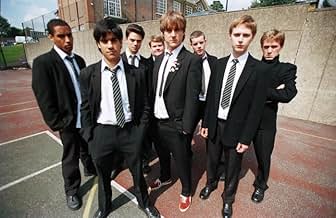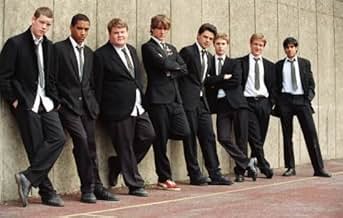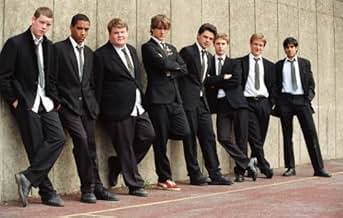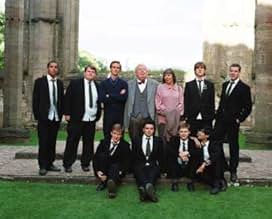Eine widerspenstige Klasse begabter und charmanter Teenager wird von zwei exzentrischen und innovativen Lehrern unterrichtet, während ihr Schulleiter darauf drängt, dass sie alle in Oxford o... Alles lesenEine widerspenstige Klasse begabter und charmanter Teenager wird von zwei exzentrischen und innovativen Lehrern unterrichtet, während ihr Schulleiter darauf drängt, dass sie alle in Oxford oder Cambridge aufgenommen werden.Eine widerspenstige Klasse begabter und charmanter Teenager wird von zwei exzentrischen und innovativen Lehrern unterrichtet, während ihr Schulleiter darauf drängt, dass sie alle in Oxford oder Cambridge aufgenommen werden.
- Nominiert für 2 BAFTA Awards
- 2 Gewinne & 15 Nominierungen insgesamt
Empfohlene Bewertungen
The above quote from the athletic, anti-intellectual Rudge in Alan Bennett's London and Broadway hit, The History Boys, is the antithesis of the high-minded quotes and philosophies spouted by teachers and aspiring "Oxbridge" scholars at a public grammar school in Yorkshire. Yet the quote epitomizes the sub-textual disdain for intellectual snobbery and solipsism that hangs about academic institutions anywhere, anytime.
History can be an accumulation of facts that have power in their reality ("This is Oxford and Cambridge. You don't just need to know it backwards. Facts. Facts. Facts."). Or it can be a set of insights into the human condition whose power derives from the understanding one extracts from them ("All knowledge is precious whether or not it serves the slightest human use."). This film reveals the tension between those poles of learning and the in-between state of wisdom.
It's 1983 in a boys' public grammar in Yorkshire as the gifted "history boys" prepare for their "Oxbridge" exams for entrance to Oxford or Cambridge. The months before the exams will put them in hyper drive as the results-oriented headmaster vies with the portly sensibility teacher, Hector, who believes more in the experience of education than the quantifiable outcomes. Memorized lines from Keats or learning French by acting out a scene in a brothel is his preferred mode.
The latent and sometimes overt homosexuality, not a stranger to boys' school, is handled as just another learning experience for boys and teachers, at least those couple of teachers such a Hector who are known to prefer boys. The sexual orientation is as much figurative for decisions that must be made and the experience that will bring understanding of life's unpredictability, not just historical facts. The acceptance and casualness of the issue stretches credulity, but not as metaphor.
The transition to film from stage is no always smooth: Some scenes are played directly into the camera; others are static, less fluid on screen than under the proscenium arch. But who cares with all that inspired dialogue? If you love to hear English as it was meant to be spoken, albeit highly stylized, and young people grappling with big ideas, see The History Boys.
The other reason is because the story is one beyond social judgment. Perhaps this is purposeful because being written, produced, directed, and acted by English people, class-consciousness is surely existent among them. But that's what I love so much about this film. The audience, in order to understand and enjoy it, must release themselves from the scrutiny of general culture over many, mostly sexual, aspects of life. The film is not about homosexuality, but homosexual goings-on exist prevalently in the story. It's also treated very nonchalantly, and many straight boys are free of any personal sexual burdens that would inhibit them from partaking. The very talked-about homosexual element of the film exists as the most direct example and also the core of the basis of the story, which is the pressure of society's judgmental and devastatingly interfering nature with many things that, if one were truly understanding, would not judge or interfere with. This extends to greater and more complex idealism in the script, such as the philosophy and meaning of education, the satisfactory or unsatisfactory pursuit and outcome of success, the importance of art and poetry, and the point of studying history.
I believe that The History Boys is an extremely important movie, and the fact that it lasted for a single week at a small theater here in Cincinnati is despicable and glaringly, stupidly contradictory to its message.
About a group of young British Oxford and Cambridge hopefuls who are being trained by their teachers to achieve this goal, "History Boys" is a film portraying young people at school that is the farthest thing from American, and that's a good thing. No characters fall into obvious stereotypes and they are all highly intelligent, gifted individuals. The boys aren't being educated to be smart, they're being challenged in their thinking and subsequently being challenged as people.
The subplot and controversy of the film is an incident involving misconduct between a student and the boys' primary teacher, Hector, played by Richard Griffiths who is most famous for his role as Uncle Vernon in the Harry Potter series. Homosexuality or the questioning of sexuality and sexual drives and the desire to please others that one is fond of (in the broadest sense) is a major undertone and many times a player in the film's events. It's a bit confusing, but it adds something more material to a film that often times seems to be footage of well-read individuals discussing literature. Anyone who is turned off by scholarly behavior and thought could not possibly enjoy this film because they'd feel bored and alienated.
The actors, all men mostly, are superb in the film, but Frances De La Tour while a definite supporting character carries her own power on the screen. The acting and characters are really the most important element of this film. It takes not time to establish its characters and relationships-you have to see them develop and insinuate them based on character interactions throughout the film. Since the film is mostly talking, there is a lot of opportunity for that.
While the viewer does feel very much on the outside of the plot, the actors and characters do tend to keep the interest level up and the ending is very nice and effective. The result is something much more meaningful and not nearly as gimmicky as the title "The History Boys" suggests.
Wusstest du schon
- WissenswertesThe cast for this movie are the same cast who appeared in the original play at the National Theatre in London, England.
- PatzerLockwood was killed in action with the York and Lancaster Regiment. They were disbanded in 1968.
- Zitate
Hector: The best moments in reading are when you come across something - a thought, a feeling, a way of looking at things - that you'd thought special, particular to you. And here it is, set down by someone else, a person you've never met, maybe even someone long dead. And it's as if a hand has come out, and taken yours.
- Crazy CreditsAt the beginning of the film, the title - "The History Boys" - is taken letter by letter from random parts of an essay on the dissolution of the monasteries, a common history topic, which the History Boys themselves write later on in the film.
- SoundtracksL'Accordéoniste
Music by Michel Emer
Lyrics by Michel Emer
© 1945 S.E.M.I., France / Peer Music (U.K.), Ltd., London
Performed by Samuel Barnett & Jamie Parker
Top-Auswahl
- How long is The History Boys?Powered by Alexa
Details
- Erscheinungsdatum
- Herkunftsländer
- Offizieller Standort
- Sprache
- Auch bekannt als
- The History Boys
- Drehorte
- Produktionsfirmen
- Weitere beteiligte Unternehmen bei IMDbPro anzeigen
Box Office
- Budget
- 2.000.000 £ (geschätzt)
- Bruttoertrag in den USA und Kanada
- 2.706.659 $
- Eröffnungswochenende in den USA und in Kanada
- 100.803 $
- 26. Nov. 2006
- Weltweiter Bruttoertrag
- 13.407.101 $
- Laufzeit
- 1 Std. 49 Min.(109 min)
- Farbe
- Sound-Mix
- Seitenverhältnis
- 1.85 : 1





































